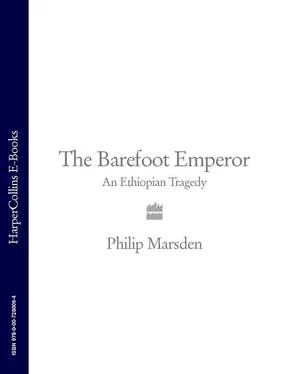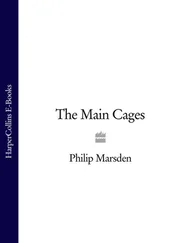17
On 7 October 1862, two and a half years after Plowden’s death, Tewodros ordered his ministers to put on their silken lemds, their lion’s-mane cloaks, their finest shammas , and to gather in his salon tent. He himself settled on a silk-covered divan. He placed a double-barrelled gun beside him, and two loaded pistols. The boom of twelve cannon bounced back and forth from the surrounding slopes.
The tent flaps lifted, and the new British consul ducked through them. He was unwell. He asked to sit down. Tewodros sensed at once that here was a different sort of man to Bell and Plowden. Charles Duncan Cameron was a little older than them. For many years he had obeyed his orders as a soldier, then served as consul in the Black Sea port of Poti. For eighteen months, he had delayed his departure from London. Tewodros’s late British friends had loved Ethiopia and none other. For Cameron it was another posting, and an uncomfortable one at that.
Tewodros began by explaining exactly what had happened to his predecessors. He listed the details of Plowden’s luckless death, and how it had been avenged. He explained that after Bell was killed he had taken five hundred prisoners and had them decapitated in Debarek market. The heads made such a large pile, the chronicler said, that they could only be counted in rows. ‘This was done,’ explained Tewodros modestly, ‘in order to win the friendship of Her Majesty.’
A couple of days later Cameron had another interview. Tewodros’s principal concern was ‘the Turks’ (meaning both Ottomans and Egyptians). In recent years, his good relations with the Egyptians had broken down. Annexing Tigray had also brought him up against the Ottomans of the Red Sea coast. He wanted to attack, to push the Egyptians back from the lowlands of the west, to march on Massawa. Before doing so, he was keen to have the support of the Christian powers of Europe.
Ethiopia, stressed Tewodros, was being encroached upon on all sides by Muslims, and he would do all he could to see off their incursions. ‘If not,’ he said, ‘I will die preventing it!’
All this talk of war and defiance worried poor Cameron: it was ‘not the sort of temper I was sent to encourage’. He made the position clear to Tewodros: if you maintain peace, we can invite your envoys to London and ensure their safe passage. But if you fight, it will be impossible.
‘Skirmishes?’
‘No.’
Cameron returned to his tent. He had done his duty. Diplomacy must follow its proper course.
Over the coming days, he noticed that the food delivered to his tent became worse, and less frequent. When he tried to see Tewodros, it was not convenient. Those charged with looking after him became curt and careless. They began to ask how long he’d be staying. When the requests were made ‘hourly’, the consul grew impatient: ‘I will stay six months if that’s what it takes to finish the work I was sent by my government to do.’
Tewodros was furious. ‘Leave for the sea at once!’ he ordered the consul.
But Cameron knew that Her Majesty’s diplomats were not dismissed like that. He stayed, and his patience was rewarded. When he did leave camp, a month or so later, he carried a letter of friendship to Queen Victoria.
Tewodros did not only write to Great Britain. He told Cameron he wanted to inform ‘all Christendom’ before making any move against the Egyptians and Turks. He wrote to France, and also possibly to Holland, Germany, Austria and Russia. Only two of these letters survive – though the common ground between these two suggests that they would all have said broadly the same thing. To Queen Victoria: ‘The Turks [Egyptians] refused to leave my father’s land when I told them to. Therefore, by the power of God, I shall fight [them] now.’
To Napoleon III: ‘The Turks [Egyptians], however, resist the will of God, and since they refuse to surrender the land of my fathers, I am going out to fight with them.’
The basis of his appeal for friendship varied a little more. To Napoleon III, he wrote: ‘The splendour of your reputation as the emperor of the French and the prince of the Christians has reached us. I rejoiced and desired that, by the Grace of God, bonds of friendship would unite us, that you would look upon me as one of your relatives, and that you would love me.’
To Queen Victoria, he recalled that ‘Mr Plowden and Liqemekwas John used to tell me that there is a Christian king, a great man, who loves Christians, with whom they would acquaint me.’ (The confusion of Victoria’s gender lay more with the scribe than with Tewodros.) He also asked to send embassies. Plowden had always made it clear that, when peace permitted, the two countries could exchange envoys. Peace was still pending. ‘Since the Turks deny me passage by sea,’ he told Queen Victoria, ‘I have been unable to send my envoy with Consul Cameron.’
To Napoleon, he said: ‘I wish to send you ambassadors. Please, Your Majesty, let me know if you will indeed receive them.’
Tewodros had made his appeal. He now settled back to wait. The threats from the Egyptians increased, but, placing all his hopes in European support, he kept his forces in camp.
18
Ten months later, Tewodros was sitting in a small recess in one of Gondar’s ancient palaces. Around him was the scatter of vellum and parchment, the nap of leather-bound books. Behind him rose a tall, glassless window. Below was the palace compound and the walls, and beyond that the town and the tents of his army and in the distance, streaked by early sun, stretched the plains, green and fertile after the rainy season. It was early on the morning of 28 September 1863, and the wild celebrations of Mesqel, the Feast of the Finding of the True Cross, were over. The great pyres had all burnt down. The city dozed.
Tewodros did not doze. He had summoned the Europeans to a meeting. Out of the half-darkness of the palace interior came Consul Cameron in his blue diplomatic uniform. He had returned, as had Monsieur Bardel, the French envoy. A number of the missionaries were with them – Theophilus Waldmeier and Reverend Henry Stern, who had been trying to convert the Falashas, the Ethiopian Jews. They all arranged themselves at the emperor’s feet, on a semi-circle of rugs.
While waiting for a reply to his letters to European capitals, Tewodros had been attacked by the Egyptians. Musa Pasha had looted Metemma, burned Dunkur, marched on Wehni. Tewodros’s hold on the lowlands was destroyed, his native Qwara overrun. He had done nothing. During his visit, Cameron had convinced the emperor that European support was too great a prize to risk with an impulsive attack. Tewodros waited for a reply to the letters.
Yet by June not one response had come back. When Cameron returned to Ethiopia just before the rains, he was empty-handed.
‘Your Majesty,’ he promised, ‘I will give my head if after two months the answer to your letter is not here.’
Tewodros was already angry with Cameron. He had not taken Tewodros’s letter himself, but sent it to London by a messenger. He then went off to travel through the eastern Sudan, the very lands that the Egyptians had overrun.
A couple of months later, Tewodros received better news. A response had arrived from the French, and he had now called the Europeans to hear it read out. He turned to M. Bardel and asked him about his mission – Bardel, who at least had had the courtesy to go to Paris.
‘Your Majesty, I met with a most uncourteous reception at the court of France.’
‘Did they provide you with a house, food and all you required?’
‘No, Jan Hoi . I got neither a house to dwell in, nor food, nor money to supply my daily wants.’
‘What did the emperor tell you when you presented my letter?’
Читать дальше












